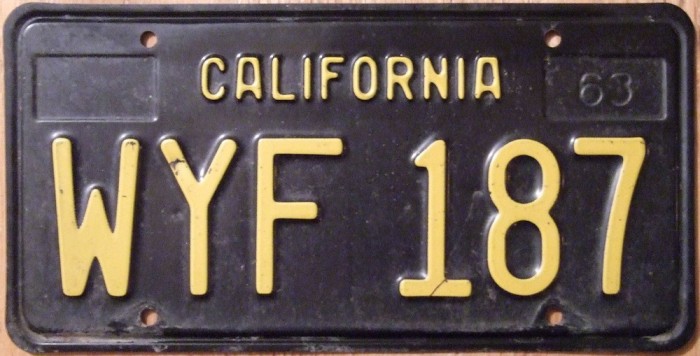California Specialty License Plates Laws
In the state of California, vehicles are required to have two license plates. This is different from some states, where only a single license plate is needed. Different states also have various requirements for each specialty plates. These laws and requirements are often subject to change, therefore we recommend checking with your local DMV for up to date guidelines and paperwork required.
Vehicles which may qualify for specialty plates include antique or collector cars, horseless carriage, vintage or historic vehicles, custom vehicles and some other types.
California also allows vehicle owners to display plates issued in the state of CA in the year the vehicle was manufactured, which are also known as “YOM” or “Year of Manufacture” plates.
Below are all the current relevant laws pertaining to specialty license plates.
- Historic Vehicle: These plates are available to vehicles manufactured after 1922 which are at least 25 years old and of historic interest.
- Horseless Carriage: Available for vehicles with an engine of 16 or more cylinders that were manufactured prior to 1965 and for vehicles manufactured in 1922 or earlier, regardless of cylinders.
- Legacy: Available to all vehicles, these are replicas of California license plates similar to those issued in the 1950s, 1960s, and 1970s.
- YOM: Vehicles manufactured in 1969 or earlier may display YOM plates with DMV approval.
Special License Plates Types
California allows ordering special license plates to recognize service, achievements, licenses, status, historical significance, occupations, etc. The categories of these special license plates include:
- Special License Plates: Exempt, livery, historical vehicles, HAM radio, veterans.
- Special Recognition License Plates Legion of Valor, Purple Heart, Gold Star Family, etc.
- Occupational License Plates: Dealers, dismantlers.
- Legislative License Plates: Senate, assembly.
- Apportioned License Plates: Power unit and prorate.
Full list is available on California DMV – Special License Plates page.
Special Interest License Plates
Special interest license plates are not the same as special license plates. Special interest plates are affiliated with specific organizations or charities who receive donations from plate fees.
Special interest plates include:
- California Agriculture: The fees collected for the CalAg License Plates, sponsored by the California Department of Food and Agriculture, support agricultural leadership development, career awareness, and training activities.
- Environmental: Environmental License Plates are standard design California plates that are personalized. The fees collected are used to support environmental programs.
- Memorial: The fees collected for Memorial License Plates help California’s law enforcement fight threats of terrorism in the Golden State.
- Arts Council: The fees collected for the Arts Council License Plates support the California Arts Council for arts education and local arts programming.
- California 1960s Legacy: The fees collected for the California 1960s Legacy License Plates are deposited into the Environmental License Plate fund, which benefits environmental projects in California.
- Whale Tail (California Coastal Commission): The fees collected for the Whale Tail License Plates, sponsored by the California Coastal Commission, help protect and restore the priceless resources of California’s coast and ocean.
- Collegiate: the fees collected for the Collegiate License Plate fund need-based scholarships and grants for participating colleges and universities in California.
- Lake Tahoe Conservancy: The fees collected from the Lake Tahoe License Plates are used by the California Tahoe Conservancy to fund preservation, restoration, and non-motorized trail projects in the Lake Tahoe area.
- Yosemite Conservancy: The fees collected from the Yosemite Conservancy License Plates are used by the Yosemite Conservancy to manage wildlife, restore habitat, and repair trails in Yosemite National Park.
- Firefighters: The fees collected from Firefighter License Plates are deposited in the California Firefighters’ Memorial fund, created and sponsored by the California Professional Firefighters. The California Firefighter license plate can only be issued to a currently registered vehicle owned by an active or retired California Firefighter or a surviving family member of a deceased California Firefighter.
- Have A Heart, Be A Star, Help Our KIDS: The fees collected from the Kids Specialty License Plates are deposited in the Child Health and Safety Fund and used for programs that keep California kids safe, which include child care safety, child abuse prevention, and efforts to prevent childhood injuries.
- Veterans’ Organizations: The fees collected from the Veterans’ Organizations License Plates are used by the California Department of Veterans Affairs to benefit participating county veteran service offices and to commemorate veteran organizations.
- Pet Lovers: The fees collected for the Pet Lovers License Plates, sponsored by the California Department of Food and Agriculture, provide funding for no- or low-cost spay and neuter programs throughout the state.
- California Museums (Snoopy): The fees collected for the California Museums License Plates go into a designated fund administered by the California Cultural and Historical Endowment (CCHE), which is used to support a grant program for museums in California.
- Breast Cancer Awareness: The fees collected for the Breast Cancer Awareness license plates support the Department of Health Care Services Every Woman Counts Program to conduct outreach and education to raise awareness about breast cancer and the importance of screening, in addition to providing breast cancer screening and diagnostic services for underinsured and uninsured California women.
These special interest license plates are a great way to spread awareness and help causes you care about.
Special License Plate Fees
Special interest license plates can be purchased as per requirements states above. Regardless whether vehicle is being operated or not, the plates have one-time issuance cost, while some also have a yearly renewal fee. Full fees list can be found on Cali DMV website here.
Fees vary from $0 to maximum $103, depending on license type. For example, “Congressional Medal of Honor” license has no issuance or renewal fee. On the other hand, “Pet Lover’s” has a $50 issuance fee plus a $40 annual renewal cost.
Learn more:
- California DMV – Standard License Plates
- California DMV – Special Interest License Plates
- General California license plates disbursement laws
